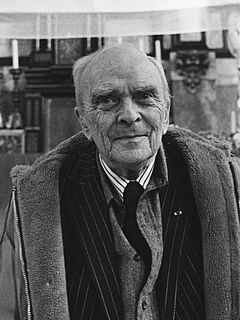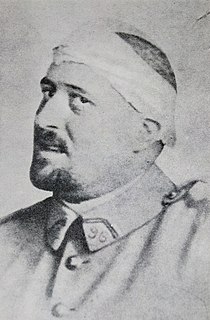A Quote by Karl Popper
Appealing to his [Einstein's] way of expressing himself in theological terms, I said: If God had wanted to put everything into the universe from the beginning, He would have created a universe without change, without organisms and evolution, and without man and man's experience of change. But he seems to have thought that a live universe with events unexpected even by Himself would be more interesting than a dead one.
Related Quotes
One can imagine that God created the universe at literally any time in the past. On the other hand, if the universe is expanding, there may be physical reasons why there had to be a beginning. One could imagine that God created the universe at the instant of the big bang, or even afterwards in just such a way as to make it look as though there had been a big bang, but it would be meaningless to suppose that it was created before the big bang. An expanding universe does not preclude a creator, but it does place limits on when he might have carried out his job!
The universe shows us the life of God, or rather it is in itself the life of God. We behold in it his permanent action, the scene upon which his power is exercised, and in which all his attributes are reflected. God is not out of the universe any more than the universe is out of God. God is the principle, the universe is the consequence, but a necessary consequence, without which the principle would be inert, unfruitful, impossible to conceive.
God created man and He created the world for him to live in and I reckon He created the kind of world He would have wanted to live in if He had been a man--the ground to walk on, the big woods, the trees and the water, and the game to live in it. And maybe He didn't put the desire to hunt and kill game in man but I reckon He knew it was going to be there, that man was going to teach it to himself, since he wasn't quite God himself yet.
It's not demons (who at least have a human face) but Hell itself that seems to be laughing inside me, it's the croaking madness of the dead universe, the spinning cadaver of physical space, the end of all worlds blowing blackly in the wind, formless and timeless, without a God who created it, without even its own self, impossibly whirling in the absolute darkness as the one and only reality, everything.
Without poets, without artists, men would soon weary of nature's monotony. The sublime idea men have of the universe would collapse with dizzying speed. The order which we find in nature, and which is only an effect of art, would at once vanish. Everything would break up in chaos. There would be no seasons, no civilization, no thought, no humanity; even life would give way, and the impotent void would reign everywhere.
Man is only a reed, the weakest in nature, but he is a thinking reed. There is no need for the whole universe to take up arms to crush him: a vapour, a drop of water is enough to kill him. but even if the universe were to crush him, man would still be nobler than his slayer, because he knows that he is dying and the advantage the universe has over him. The universe knows none of this.
He had said, "I am a man," and that meant certain things to Juana. It meant that he was half insane and half god. It meant that Kino would drive his strength against a mountain and plunge his strength against the sea. Juana, in her woman's soul, knew that the mountain would stand while the man broke himself; that the sea would surge while the man drowned in it. And yet it was this thing that made him a man, half insane and half god, and Juana had need of a man; she could not live without a man.
As we shall see, the concept of time has no meaning before the beginning of the universe. This was first pointed out by St. Augustine. When asked: What did God do before he created the universe? Augustine didn't reply: He was preparing Hell for people who asked such questions. Instead, he said that time was a property of the universe that God created, and that time did not exist before the beginning of the universe.
When I see the blind and wretched state of men, when I survey the whole universe in its deadness, and man left to himself with no light, as though lost in this corner of the universe without knowing who put him there, what he has to do, or what will become of him when he dies, incapable of knowing anything, I am moved to terror, like a man transported in his sleep to some terrifying desert island, who wakes up quite lost, with no means of escape. Then I marvel that so wretched a state does not drive people to despair.






































